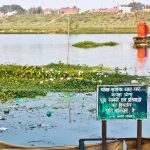The Gomti River taught me swimming
Dr. R.K. Pachauri is an economist and industrial engineer who studied at Lucknow’s La Martiniere College.
He is head of the Delhi based The Energy and Resources Institute (TERI), an independent, not-for-profit research organization deeply committed to every aspect of energy, environment, and sustainable development. As chairperson of the Nobel Peace Prize winning and Geneva based climate change body called the Intergovernmental Panel on Climate Change (IPCC), he is recognised internationally as a leader on environmental and energy issues and their policy dimensions.
Dr Pachauri took time off from his very busy schedule to talk to The Lucknow Observer about the sorry state of the Gomti River, even sharing with readers his memories of the river when he was just a lad in Lucknow.
How would you describe the plight of the Gomti?
I think the present plight of the Gomti River is sad and, of course, a source of deep distress not only for the residents of Lucknow but all Indians who see all our river systems reaching levels of pollution which are far beyond acceptable standards.
What is the significance of the Gomti to a fast industrialising city like Lucknow?
Industrialisation does not necessarily have to lead to the pollution of rivers. In the industrialised countries of the west till about the 1960s and 1970s most rivers had suffered large scale pollution from industry and other sectors of the economy. However, in response to the strong environmental movement that took effect in those countries, during the last four decades or so there has been a major improvement in the water quality of all those rivers. As a result the rivers have come to life. There is no reason why we cannot ensure industrialisation which at the same time protects the environment. We need effective monitoring and the enforcement of regulations to ensure that industrial units do not pollute the Gomti and other rivers in the country. We hope that the new Government of India under the leadership of Shri Narendra Modi will bring about some changes in governance systems related to the environment.
What is the worst that can happen to all of us if the Gomti is left to stagnate?
If the Gomti is left to stagnate, there will be an increase in disease and a decline in recreational benefits that a river can provide to people who live around it and those who look for such benefits that a river provides and of course no life will survive in the Gomti. Fishermen, therefore would have to look for other occupations or go elsewhere to catch fish.
What can be done by ordinary citizens to care for the river?
Ordinary citizens have to get together and form groups which carefully monitor pollution and identify polluters so that appropriate action can be taken under the law. Essentially, ordinary citizens have to develop a sense of pride of ownership in our river systems and become stakeholders in safeguarding the water quality in our rivers.
What are your memories of the Gomti when you were a student at the La Martiniere college?
When I was a student in Lucknow I had lived very close to the River Gomti on a road which runs parallel to it called Tagore Marg. I actually learnt to swim in the River Gomti. There was a group of trainers who taught swimming and had operated beside the River Gomti, a very short walk from my home and that is where I learnt to swim. To graduate in swimming, the training outfit was to cross the river when the instructors felt confident that a swimmer was ready to do so.
Of course, when one of us swam across the river for the first time the trainer would swim along. Then the river was not polluted and was still substantially clean. Therefore, I find it very sad when I see the extent to which the quality of water in the river has deteriorated.
I hope that the people of Lucknow and those living by the river upstream will take action to clean up the pride of Lucknow, which is the Gomti River.




